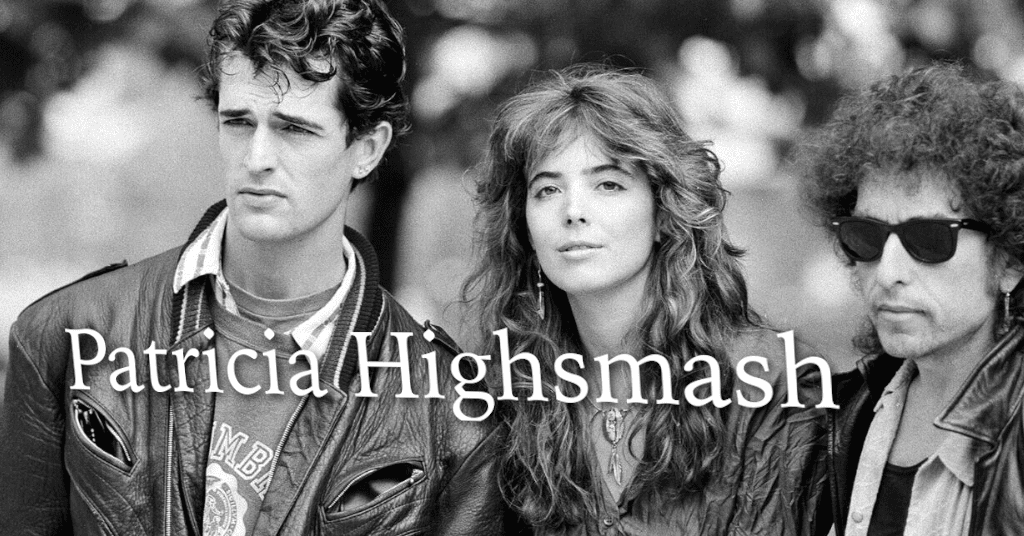Patricia Highsmash
Movie Bob Dylan: Hearts of Fire
by Travis Hedge Coke
I always knew Hearts of Fire wasn’t going to be one of those really good movies, but I’m never prepared for much of the ire probably being because it is not a movie about how hard it is to be a male rock star and the wisdom they can impart, but about how shit many men in the music industry, and the world, can be to women and so they are.
Bob Dylan was the marquee name, but Hearts of Fire does not star Bob Dylan or Rupert Everett, who plays the other successful male rocker who struggles under fame and infamy. Hearts of Fire stars Fiona as Molly McGuire, and it is Molly McGuire’s movie. I don’t mean she shines brighter than the other two actors or characters, though this is true. I mean literally the narrative of the movie is shaped around her, she has more screen time than anyone, and her character’s wants and growth are at the fore. Hearts of Fire is a movie about Molly McGuire. She looks to Everett’s James Colt and Dylan’s Billy Parker for help, wisdom, comfort and encouragement and perspective, but any time either of those men comes close to saying something useful or intelligent, they wreck it by being self-absorbed sexist dicks. And, that’s the point. The misogynist language is rarely loud and melodramatic, but it is continuous and sewn into every fabric of their lives and beings.
So, why the struggle? Why fight logic and screen time to emphasize the men? If the movie does not make itself about men, why would audiences?
Bob Dylan was certainly a big star, comparatively, but he was not an especially big star, even in music, at that moment. Rupert Everett had done more movies than Fiona, who would not do much after this, but he would be a rising star at most, and in American terms? They are, contrary to received wisdom, both fairly good at their roles. The roles simply are not what the broadest audience expected them to be. I have seen Dylan’s Parker compared to Elvis, to Elvis’ movie characters, to James Dean, to Mick Jagger, who was originally pursued, and sure, maybe Mick Jagger, in the sense that you know his bandmates have a codename for him so they can talk shit to his face and he would not know it was him.
Bob Dylan is whoever you mistake him to be.
Hearts of Fire is no celebration of the lone, rebel philosophizing male rocker. They each obviously simply bought in, and bought into an image. Parker and Colt are corporate images. Billy Parker’s most famous song, in the movie, is beloved by in-world fans, and Molly McGuire pleads with him to come onstage and perform it with her, but when they do, it’s the most vacuous presentation of a not-that-great-anyway John Hiatt song, The Usual, which Parker later tells McGuire he wrote “in two minutes” for a woman who “used to really turn me out.” It’s a fluff song that doesn’t mean nothing.
Dylan’s Billy Parker is never not Bob Dylan, but he takes surprising offense at the violence of casual sexism, has Everett’s James Colt mirroring his semi-long hair, cocking his head up, both of them kind of doing what Prince would really perfect. Minnesota and Norfolk by way of Minnesota. Purple Rain casts its floodlights, too.
Fiona shows Fiona’s Molly McGuire shows Billy Parker a pond he used to know in youth. She strips to skinny dip, he skinny dips in his full clothing then gets worried he will be found out. Colt shows her massive lake.
Audiences focused on, and continue to emphasize the men, because we don’t see what we see, we don’t hear what we hear. We see what we are told and we hear what we expect.
The director, Richard Marquand, had done a Star Wars movie when those were much more of a rarity, he’d directed thrillers, dramas. A well-rounded oeuvre that tended to put men in the front even if women were the primary character. Carrie Fisher felt mistreated on his Star Wars. Glenn Close was mistreated shooting Jagged Edge, though reportedly by the producer, not the director. The terms, “plodding” and “predictable,” haunted his career, but so did “satisfactory,” “grimly funny,” and “well-crafted.”
Critic, Rita Kempley, pinned the misogyny and trading in sexism directly to Marquand, explicitly for Jagged Edge, but it fits his whole career. Did Marquand intend to make a movie about sexism or did he, at the end of his life, make simply a sexist movie?
Is “de-pussying” a good thing, or snide machismo? How serious is anyone?
I am no wiser or sharper than the rest. It helps to have a lot of distance. And, to give the movie a second thought, which nobody owes it. Whether or not it was made as a sexist movie, it escapes itself, if so, by presenting its sexism so plainly and by the protagonist making every effort to hold that atmosphere in disdain, to react shocked or hurt or angry or done with every loud or subtle misogynist gesture.
With McGuire in the front of your mind, the movie becomes a movie worth watching once. And, if she was not at the front of your mind when you watched it, watching it that way will be your first time to see the picture.
